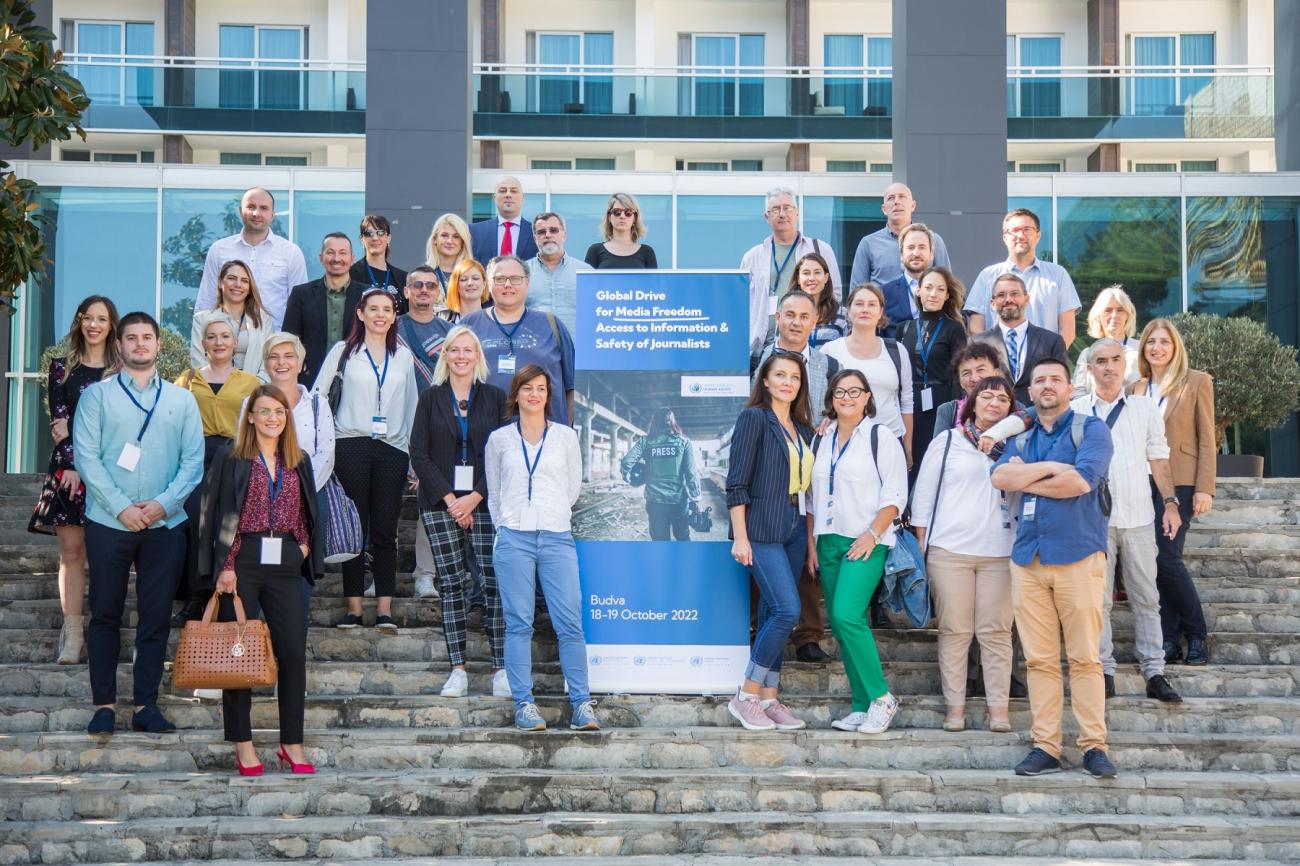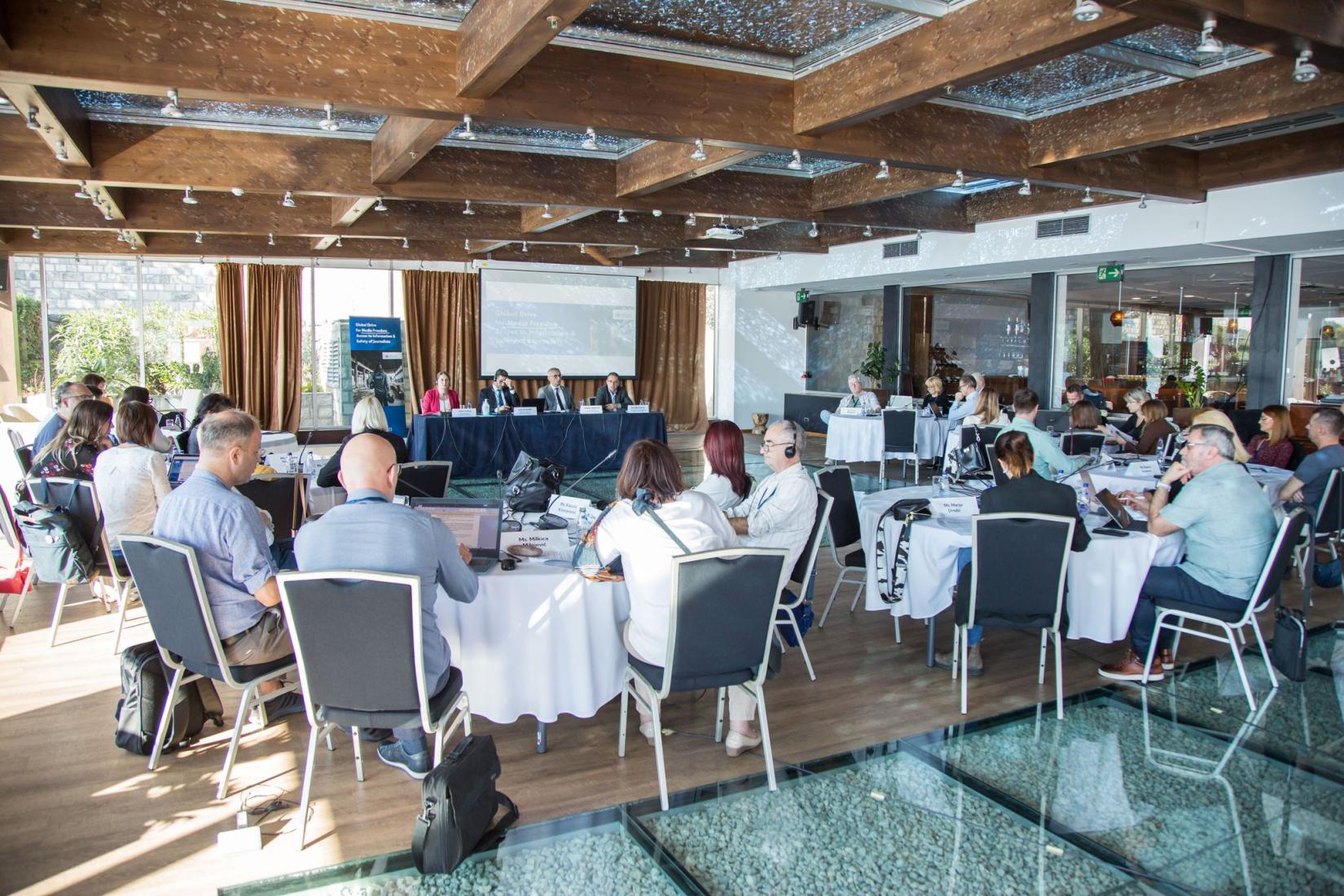Merging strengths in the region for a freer media and safer journalism

Journalists and stakeholders from Bosnia & Herzegovina, Montenegro and Serbia come together to discuss how to advance media freedom and safety of journalists.
Budva, Montenegro – 18-19 October 2022
Freedom of the media and safety of journalists were at the heart of a two-day regional meeting of 30 journalists, editors, researchers and civil society representatives from Bosnia and Herzegovina, Montenegro and Serbia in Budva, Montenegro.
Facilitated by UN human rights teams in the three countries and the Office of the High Commissioner for Human Rights in Geneva, participants discussed how to ensure an enabling and conducive environment for journalists and other media personnel so that they can safely, freely and effectively investigate and report on issues of public interest in a professional manner.
Protection for journalists in the region was highlighted as insufficient, with many attacks and threats remaining unpunished. Participants underlined the importance of better institutional responses and the need to improve laws and policies and guarantee better implementation.
They shared good practices, of associations and unions which are playing a critical role in advocating for the rights of journalists, and of existing mechanisms like commissions dealing with attacks against journalists and hotlines to report threats and attacks and to elicit rapid responses. They also shared experiences of how they engage in the important work of fact-checking.
“Information is oxygen for a well-functioning democracy”, said Dragiša Janjušević, State Secretary in the Ministry of Public Administration, who noted the importance of access to information and highlighted the commitment to increased transparency in the new 2022-2026 Strategy on Public Administration Reform.

Looking forward, participants recommended a number of actions like improving the status of journalists, their labour conditions and social protection; empowering them to more effectively stand up for their rights through continuous training and capacity building; making more use of United Nations human rights mechanisms; specialized trainings for the police, the judiciary, and other institutions to ensure accountability for threats and attacks against journalists and to prevent Strategic Lawsuits Against Public Participation (SLAPP) against them; and establishing independent mechanisms to allocate more and transparent funding for the media. “Freedom of the media should become an important political question, so that it can be truly realized and existing impunity can end”, one participant said.
Participants asked the UN to advocate with decision makers to respect and protect a free media, to provide technical support, training on hate speech and its boundaries with the freedom of expression, and facilitate exchanges between journalists in the region. “UN international human rights treaties and relevant action plans provide important guidelines for all media organizations, and we should work harder to promote them through a strategic effort between the media and the UN,” one participant said.
Participants clearly recognized the need for more cross-border collaboration to better address and counter incitement to hostility, violence, and discrimination, as well as hate speech, both online and offline, noting how this is especially affecting women journalists.
Acting General Director Neđeljko Rudović of the Media Directorate in the Ministry of Culture and Media informed of ongoing efforts to improve the legal and strategic framework to guarantee freedom of the media. “We are not a free people if we do not have a free media”, Mr. Rudović emphasized.
Through interventions from the Special Rapporteur on human rights defenders, the Vice Chair of the UN Human Rights Committee, and OHCHR in Geneva, participants heard how they can engage with UN human rights mechanisms as part of their own protection and advocacy strategies to promote and protect media freedom, access to information, and the safety of journalists.
The meeting was organized under the joint OHCHR-UNESCO Global Drive on Media Freedom, Access to Information, and Safety of Journalists, which is funded by the Kingdom of the Netherlands. representatives of the OSCE and the Council of Europe, based in Montenegro, attended as observers.


